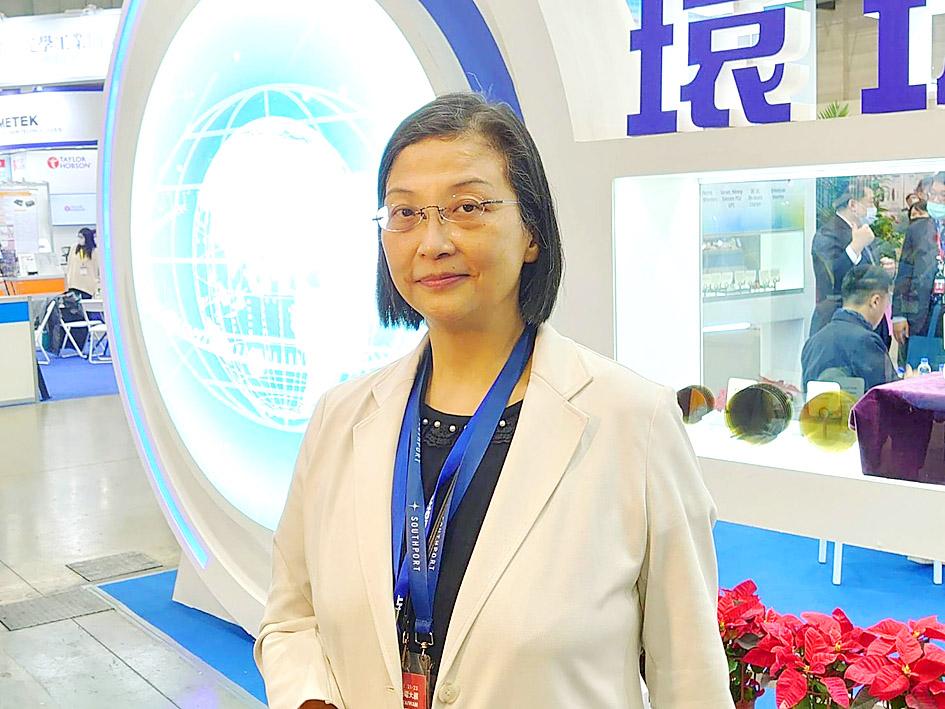GlobalWafers Co (環球晶圓) is close to clearing an important regulatory hurdle in its US$5.3 billion acquisition of German silicon wafer manufacturer Siltronic AG, people familiar with the matter said.
The Chinese State Administration for Market Regulation (SAMR) has said that it is largely comfortable with the antitrust remedies proposed by the companies and could make a formal decision shortly, the people said, asking not to be identified as they were discussing confidential information.
The deal still requires approval from the German Federal Ministry for Economic Affairs and Climate Action, and those discussions are ongoing, the people said.

Photo: CNA
GlobalWafers shares were up as much as 7.6 percent in Taipei yesterday, while Siltronic rose 1.1 percent in Frankfurt on Tuesday, giving it a market value of about US$4.7 billion.
“We are still waiting for the final approval in China, but all questions have been answered,” GlobalWafers chairwoman Doris Hsu (徐秀蘭) said in an interview with German newspaper Frankfurter Allgemeine Zeitung published on Tuesday.
The German government might be concerned that GlobalWafers is headquartered in Taiwan, rather than in Europe, she added.
A representative for Siltronic declined to comment, while a SAMR spokesperson could not immediately be reached for comment outside regular business hours.
A representative for the German economy ministry had no immediate comment.
GlobalWafers and Siltronic announced their tie-up in December 2020.
The companies said in October last year that they were in protracted discussions over regulatory clearances in China and Germany.
The takeover would be GlobalWafers’ largest ever and also one of the chip industry’s biggest in the past few years.
Competition in the market for semiconductors is heating up as companies that were once customers such as Apple Inc, are designing their own chips and established players such as Nvidia Corp branch out into new areas.
Headquartered in Munich, Siltronic is a leading maker of silicon wafers used in products such as smartphones, computers, navigation and digital displays.
It has production sites and offices in Germany, the US and other advanced manufacturing countries.
Nomura Holdings Inc advised GlobalWafers on the deal, while Credit Suisse Group AG worked with Siltronic.

South Korea’s equity benchmark yesterday crossed a new milestone just a month after surpassing the once-unthinkable 5,000 mark as surging global memory demand powers the country’s biggest chipmakers. The KOSPI advanced as much as 2.6 percent to a record 6,123, with Samsung Electronics Co and SK Hynix Inc each gaining more than 2 percent. With the benchmark now up 45 percent this year, South Korea’s stock market capitalization has also moved past France’s, following last month’s overtaking of Germany’s. Long overlooked by foreign funds, despite being undervalued, South Korean stocks have now emerged as clear winners in the global market. The so-called “artificial intelligence

‘SEISMIC SHIFT’: The researcher forecast there would be about 1.1 billion mobile shipments this year, down from 1.26 billion the prior year and erasing years of gains The global smartphone market is expected to contract 12.9 percent this year due to the unprecedented memorychip shortage, marking “a crisis like no other,” researcher International Data Corp (IDC) said. The new forecast, a dramatic revision down from earlier estimates, gives the latest accounting of the ongoing memory crunch that is affecting every corner of the electronics industry. The demand for advanced memory to power artificial intelligence (AI) tasks has drained global supply until well into next year and jeopardizes the business model of many smartphone makers. IDC forecast about 1.1 billion mobile shipments this year, down from 1.26 billion the prior

People stand in a Pokemon store in Tokyo on Thursday. One of the world highest-grossing franchises is celebrated its 30th anniversary yesterday.

Chinese artificial intelligence (AI) start-up DeepSeek’s (深度求索) latest AI model, set to be released as soon as next week, was trained on Nvidia Corp’s most advanced AI chip, the Blackwell, a senior official of US President Donald Trump’s administration said on Monday, in what could represent a violation of US export controls. The US believes DeepSeek will remove the technical indicators that might reveal its use of American AI chips, the official said, adding that the Blackwells are likely clustered at its data center in Inner Mongolia, an autonomous region of China. The person declined to say how the US government received